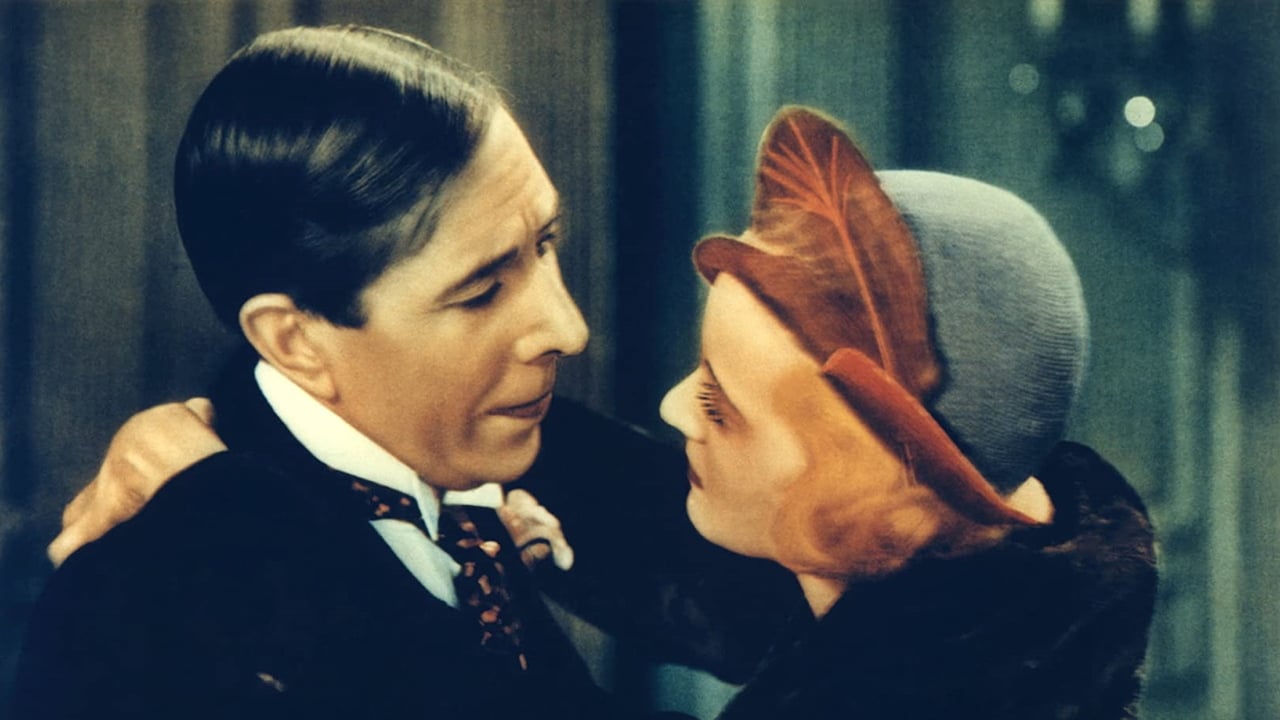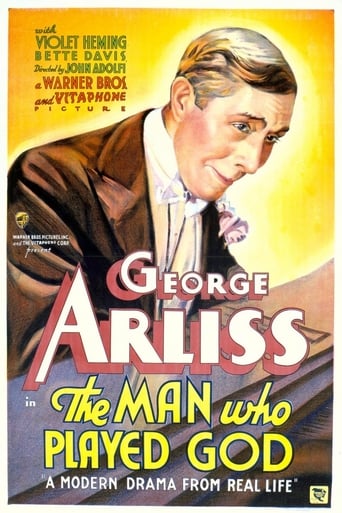

ridiculous rating
... View MoreTells a fascinating and unsettling true story, and does so well, without pretending to have all the answers.
... View MoreThis is a small, humorous movie in some ways, but it has a huge heart. What a nice experience.
... View MoreYes, absolutely, there is fun to be had, as well as many, many things to go boom, all amid an atmospheric urban jungle.
... View MoreMany of the reviews have focused on Arliss and Davis, and deservedly so. Hence there's no need to rehash that material. I want to highlight the excellent supporting cast.Violet Heming (1895-1981) plays a suitor for Arliss. She was a British stage actress who worked with Arliss. She made few films (part of Thanhouser) and is best known for her stage work, which is unfortunate for the rest of us since her acting is really exceptional.Louise Closser Hale (1872-1933) plays Arliss' sister and confidant. She combined a grandmotherly spirit with a quick wit and a sometimes tart edge in supporting roles ("Daddy Long Legs", "Shanghai Express", "Platinum Blonde") and her skill is probably nowhere better on exhibit than in this film.Ivan Simpson (1875-1951) plays Arliss' manservant. He was a Scottish stage and film actor who worked with Arliss during the silent era. He made more than 100 films and later transitioned to TV. He was used extensively in the British dramas ("Prince and the Pauper", "Lloyds of London", "Captain Blood", "Mutiny on the Bounty"). This is probably the best example of his considerable talents, and the chemistry between he and Arliss is a joy to watch.Look for Ray Milland (uncredited) in a brief scene in which he plays a man threatened with prison. For Milland (1907-86) this was his 15th film and fame was still a few years ahead. Ultimately he won an Oscar for "The Lost Weekend" (1946).Also look for Hedda Hopper (1885-1966) as a west coast society matron. She is better known for her gossip columns, but she did, in fact, appear in over 100 films between 1916 and 1946.This isn't a perfect film. It's a bit too long, Arliss does a few too many silent era long closeups, and the age difference between Arliss and Davis (24 vs. 65) is a bit too much. Otherwise it is a definite treat and holds up well after all these years.
... View More"Of Human Bondage," (1934) by RKO, to whom Bette Davis was 'loaned' by Warner Brothers, is most often given credit for the beginning of the Queen of the Silver Screen's magnificent acting career. That's not the historical fact, however; this movie, "The Man Who Played God," (1932) must be credited for bringing Bette Davis the recognition as an actor who could hold her own in the lead next to the great screen legend, George Arliss. Davis was only 23 years of age when filming the show that earned her enough screen status for RKO to even desire her to play the leading, (dare I say) 'lady' next to leading man, Leslie Howard in "...Bondage." Arliss is to be credited for having, more or less, discovered Bette Davis; phoned her & the rest of her acclaimed acting career began.So many of the critiquers repeat the myth that "... Bondage" is the film that made the world recognize how great an actor Davis was. But, if it was, RKO would have never even wanted her so badly that they 'got her on loan' from the Warners! RKO recognized the talent of Bette Davis in this film: "The Man Who Played God." So should we.Never underestimate what young adult & teen women can achieve. After all, Mary Shelley wrote "Frankenstein," when she was only 19 years of age in a bet with great poets, Lord Byron & her husband Percy Bysche Shelley. Ann & Nancy Wilson of the rock band "Heart," composed many of their best songs when they were 13 years of age! Davis had already been on Broadway before taking her role in this movie. In fact, her acting career began when she was 15 (in 1923). Davis went on (& on!) to co-lead with Lillian Gish in "Whales of August," (1987), having been in over 100 movies; was the first woman to receive an Oscar at Warner Brothers (for "Dangerous"); the first person to be nominated for an Oscar 5 years in a row; the first woman to receive the AFI's Lifetime Achievement Award; the first person to be nominated for 10 Oscars; the highest paid woman during her prime. She was the epitome of a trail blazer who had to do it "the hard way." Today, Robert Wagner, Miss Davis's son, Michael, & Miss Davis's closest assistant are key figures who keep Bette Davis's acting excellence alive, through the foundation named after her. Meryl Streep was the first actor to benefit from Davis's foundation. Obviously, the foundation board is taking Davis's acting acumen as a serious measure by which to select recipients of foundation awards & scholarships. Davis herself was the one to recognize Streep's acting abilities.That's what kind of lady she was: she'd take a step back on the set to boost someone else's acting career; she'd take steps forward to seek out great scriptwriters, directors, cinematographers, etc. She strove to not only circulate her own gifts, but wanted to help others people do so with theirs--and still does so. Her reputation on the set was not as a "star," struck with ego maniacal lights in her fabulously expressive eyes. Instead, she was known to be a pleasure to work with amongst the team workers; and a real tough lady to contend with when she sensed something was amiss in a line, scene, lighting, direction, or co-worker. But, as Robert Wagner tells of Davis, she was truly a fun person to work with because she "always" came to work prepared to put on her very best performance. And when she goofed, she did so with a kind of cute humility that was full of wit enough to crack-up the co-workers she liked. There's a huge difference between striving for perfection and believing we're perfect. Davis did the former. By the way, she gave her "Jezebel" Oscar to her son, Michael. Steven Spielberg bought her "Dangerous" one that was auctioned (for the second highest price ever) to benefit her foundation. This says to me that Davis herself knew she'd really earned her "Jezebel" Oscar; whereas it was no secret that the masses believed she got the "Dangerous" Oscar as a "consolation prize" for not even being nominated for, "Of Human Bondage." By my standards, Davis was robbed of her third Oscar for playing the role of Charlotte Vale in "Now, Voyager." In Davis's mind, she was robbed of (what would have been her fourth) Oscar for playing Baby Jane Hudson in, "What Ever Happened to Baby Jane?"Davis herself credited George Arliss & this movie for jump starting her into untouchable acting achievements. This movie is the movie to own if we want to say we've got a copy of Bette Davis's first great one.
... View MoreIn 1932 many actors were still rather new to sound pictures and the great majority of them were theatre trained and while some would stay on in Hollywood, many would return to the stage to stay. Bette Davis was a young actress in the midst of making that decision to aty in Hollywood or return to New York and the stage. She had made several low buget pictures, but things just were not clicking for her. The success of this movie and the attention she received convinced her to stay on and make movies and we are all thankful for that. George Arliss was a grand old man of the stage and his artistry is well portrayed here. His makeup is a little heavy, making him look a little like the Phantom of The Opera with lipstick and darkened nostrils, but soon you get beyond that. The acting is almost strictly stage-style here, this MUST have been a play before it was filmed. The blocking and angles of the actors and the way they seem to talk "at" each other rather than to each other shows the stage acting. Great story, nice escapism... who wouldnt like to help others? We can do that through George Arliss in this movie.
... View MoreAn aging & celebrated concert pianist completely loses his hearing, and with it his faith in The Almighty. After learning to lip read, he realizes he can once again enter into people's lives, alleviating the misfortunes of total strangers. With this much power to do good, he becomes THE MAN WHO PLAYED GOD.Although sadly neglected today, George Arliss was one of the very greatest of film actors of the 1930's. His art was consummate - a whole volume of emotion could be conveyed by the slightest movement of face or posture. He gives a wonderful performance here as a man torn from what he loves the most, blaming God for it and eventually finding peace.A splendid actress of the same period, Louise Closser Hale gives quiet dignity to the role of Arliss' sister. As his protégé, young Bette Davis does a fine job; she always considered this to be her first film role of substance. Ivan F. Simpson is excellent as a very loyal butler. Hedda Hopper has a tiny role as a woman at a picnic & look for an uncredited Ray Milland as a young man in Central Park attempting suicide.
... View More